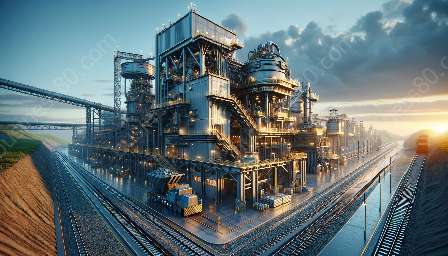In the field of mineral processing and metals & mining, thickening plays a crucial role in separating solids from liquid in a way that optimizes the process. Understanding the principles, methods, and technologies involved in thickening is essential for achieving efficient operations and maximizing the value of extracted minerals.
The Importance of Thickening
Thickening is a fundamental process in mineral processing that aims to separate suspended solids from a liquid to produce a concentrated and clarified solution. This process is vital for various stages of metals & mining operations, such as ore processing, tailings management, and environmental compliance.
Principles of Thickening
The fundamental principle behind thickening is the settling of solid particles in a liquid under the influence of gravity. By controlling the settling rate and promoting the formation of a dense phase, the process enhances the separation of solids and liquids, leading to the desired concentrated product.
Methods of Thickening
Various methods are employed in thickening processes, including conventional gravity thickeners, high-rate thickeners, and advanced technologies such as paste thickeners and deep cone thickeners. Each method has unique advantages and is selected based on specific operational requirements and desired outcomes.
Conventional Gravity Thickeners
Also known as sedimentation thickeners, these are the most commonly used thickening devices. They utilize the natural settling of particles in a quiescent environment to achieve separation and produce a thickened underflow.
High-Rate Thickeners
High-rate thickeners are designed to handle higher throughputs and are often used in applications where a rapid separation of solids and liquids is required. They feature improved feedwell designs and higher sidewall heights to promote better settling and higher underflow densities.
Advanced Thickening Technologies
Technological advancements have led to the development of paste thickeners and deep cone thickeners, which offer enhanced performance in terms of higher underflow densities, better overflow clarity, and lower water consumption. These technologies are particularly beneficial for managing challenging materials and achieving environmental sustainability.
Thickening in Metals & Mining
In the metals & mining industry, thickening is critical for various processes, including mineral processing, tailings management, and water recovery. Effective thickening contributes to reducing water consumption, minimizing environmental impact, and maximizing the recovery of valuable minerals.
Ore Processing
During ore processing, thickening facilitates the production of concentrated slurries or pastes that can be further processed for extracting valuable metals. Integrated with other unit operations, such as grinding, flotation, and dewatering, thickening optimizes the overall recovery of minerals.
Tailings Management
Thickening is essential for tailings management, as it enables the efficient separation of solid tailings from liquid to produce a manageable and environmentally compliant waste stream. This process minimizes the risk of environmental contamination and allows for responsible disposal or reuse of tailings.
Water Recovery
Thickening plays a crucial role in water recovery systems, enabling the recycling and reuse of process water. By concentrating the suspended solids, thickening promotes the effective treatment of wastewater and the recovery of clean water for various operational needs, contributing to sustainable water management.
Technological Advancements in Thickening
The continuous development of thickening technologies has led to innovations that enhance process efficiency, reliability, and sustainability. Innovations such as advanced control systems, improved instrumentation, and integrated automation have enabled greater operational control and optimization.
Advanced Control Systems
Modern thickening operations benefit from advanced control systems that utilize real-time data, process modeling, and predictive analytics to optimize thickener performance. These systems enable operators to respond to changing process conditions, enhance equipment reliability, and improve overall process efficiency.
Instrumentation and Automation
Advancements in instrumentation and automation technologies have resulted in improved monitoring and control of thickening processes. Cutting-edge sensors, automatic flocculant dosing systems, and intelligent control algorithms contribute to precise control of key parameters, leading to optimized thickener operation and enhanced product quality.
Conclusion
Thickening is a fundamental aspect of mineral processing and metals & mining operations, playing a critical role in achieving efficient solids-liquid separation, environmental compliance, and resource optimization. Understanding the principles, methods, and technological advancements in thickening is essential for enhancing operational performance and sustainability in the industry.

